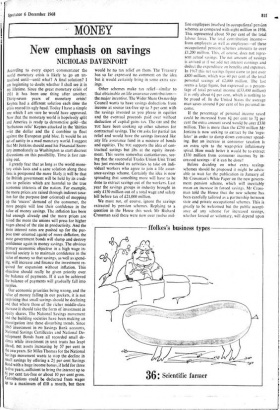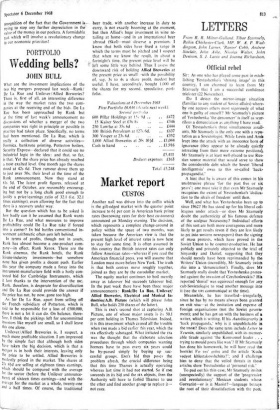New emphasis on savings MONEY
NICHOLAS DAVENPORT
According to every expert commentator the world monetary crisis is likely to go on un- resolved until—until what? A final solution? I am beginning to doubt whether I shall see it in my lifetime. Since the great monetary crisis of 1931 it has been one thing after another. Thirty-seven years of monetary crisis! Keynes had a different solution each time the crisis reared its ugly head. Today I have a simple one which I am sure he would have approved. Now that the monetary world is hopelessly split arid America is ready to demonetise gold—the 'barbarous relic' Keynes attacked in the 'thirties —let the dollar and the £ combine to float against the European gold bloc. It would be an act of sanity in a mad monetary world. I suggest that Mr Jenkins should send his Financial Secre- tary immediately to Washington to start discreet discussions on this possibility. Time is fast run- ning out.
greatly fear that as tong as the world mone- tary crisis lasts and a sane solution along these lines is postponed the more likely it will be that the British government will be held by its credi- tors to policies which are harmful to the true economic interests of the nation. For example, the more prices are raised -through indirect taxa- tion for the purpose OAF oriented) of mopping up the 'excess' demand of the consumer, the more people will lose their confidence in the value of money savings. The inflation has been bad enough already and the more prices are raised the more the unions will press for higher wages ahead of the rise in productivity. And the more interest rates are pushed up for the pur- pose (IMF oriented again) of more deflation, the more government bonds will slump and destroy confidence again in money savings. The obvious primary economic objective in a high wage in- dustrial society is to maintain confidence in the value of money so that savings, as well as spend- ing, will increase and finance the investment re- quired for expansion without inflation. This objective should really be given priority over the balance of payments. If it can be achieved the balance of payments will gradually fall into surplus.
Our economic priorities being wrong, and the value of money falling in our pockets, it is not surprising that small savings should be declining and that where those of the richer middle-class increase it should take the form of investment in equity shares. The National Savings movement and the building societies have been making an Investigation into these disturbing trends. Since 1965 investment in PO Savings Bank accounts, National Savings Certificates and National De- velopment Bonds have all recorded small de- clines while investment in unit trusts has leapt ahead, net assets increasing by 57 per cent in the two years. Sir Miles Thomas for the National Savings movement wants to stop the decline in small savings by offering a 24 per cent Savings Bend with a huge income bonus, if herd for three to five years, sufficient to bring the interest up to 6i per cent tax-free or about 10 per cent gross. Contributions could be deducted from wages IV to a maximum of £10 a month, but there
would be no tax relief on them. The Treasury has so far expressed no comment on the idea but it would certainly bring in some extra sav- ings.
Other schemes make tax relief—similar to that obtainable on life assurance contributions— the major incentive. The Wider Share Ownership Council wants to have savings deductions from income at source tax-free up to 5 per cent with the savings invested as you please in equities and the eventual proceeds paid over without deduction of capital gains tax. The CBI and the TUC have been cooking up other schemes for contractual savings. The cm asks for partial tax relief and would have the savings invested like any life assurance fund in a mixture of bonds and equities. The TUC supports the idea of con- tractual savings but jibs at the equity invest- ment. This seems somewhat cantankerous, see- ing that the successful Trades Union Unit Trust has just extended its activities to take on indi- vidual workers who agree to join a life assur- ance-savings scheme. Certainly the idea is now spreading that something more will have to be done to extract savings out of the workers. Last year the savings groups in industry brought in only £150 million out of a total wage and salary bill before tax of £21,000 million.
We must not, of course, ignore the savings extracted by pension schemes. Replying to a question in the House this week Mr Richard Crossman said there were now over twelve mil- lion employees involved in occupational pension schemes as compared with eight million in 1956. This represented about 50 per cent of the total labour force. The total contribution income— from employers as well as employees—of these occupational pension schemes amounts to over £1,200 million. This, of course, does not repre- sent actual savings. The net amount of savings is arrived at if we add net interest earnings and deduct the expenditure on benefits and expenses. In 1967 this net savings figure came to just over £200 million, which was 40 per cent of the total personal savings of £2,000 million. The last seems a large figure, but expressed as a percen- tage of total personal income (£33,400 million) it is only about 64 per cent, which is nothing to be proud of. In the United States the average man saves around 8 per cent of his personal in- come.
If the percentage of personal income saved could be increased from 64 per cent to 74 per cent the extra amount saved would be over £330 million. This is more than the £250 million Mr Jenkins is now seeking to extract by the 'regu- lator' in order to damp down consumer spend- ing. But an increase in consumer taxation is an extra spin to the wage-price inflationary spiral. How much better it would be to extract £330 million from consumer incomes by in- creased savings—if it can be done!
Before deciding on what extra savings schemes should be proposed it might be advis- able to wait for the publication in January of Mr Crossman's White Paper on the new govern- ment -pension scheme, which will inevitably mean an increase in forced savings. Mr Cross- man told the House that the new scheme has been carefully tailored as a partnership between state and private occupational schemes. This is greatly to be welcomed but the public accept- ance of any scheme for increased savings, whether forced or voluntary, will depend upon recognition of the fact that the Government is— trying to stop any further depreciation in thel value of the money in our pockets. A formidable task which will involve a revolutionary change ta our economic priorities!



































 Previous page
Previous page